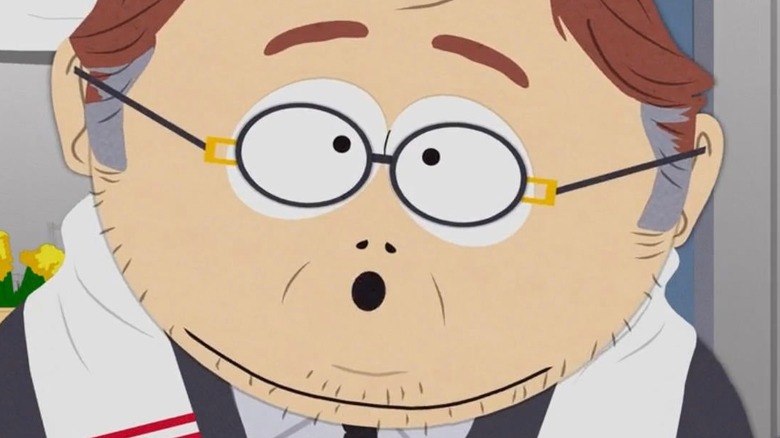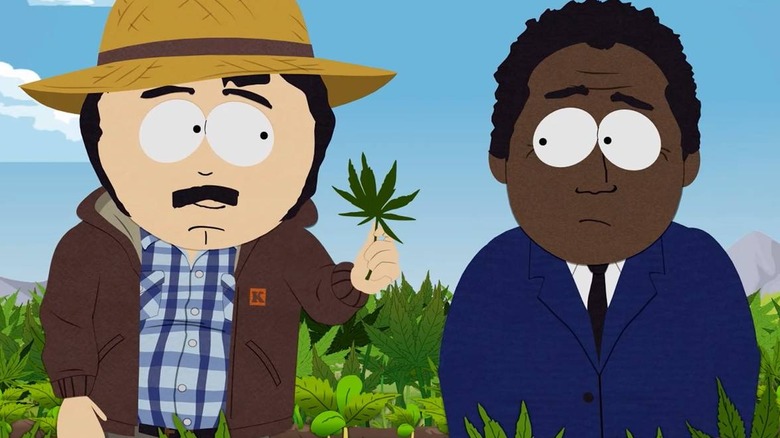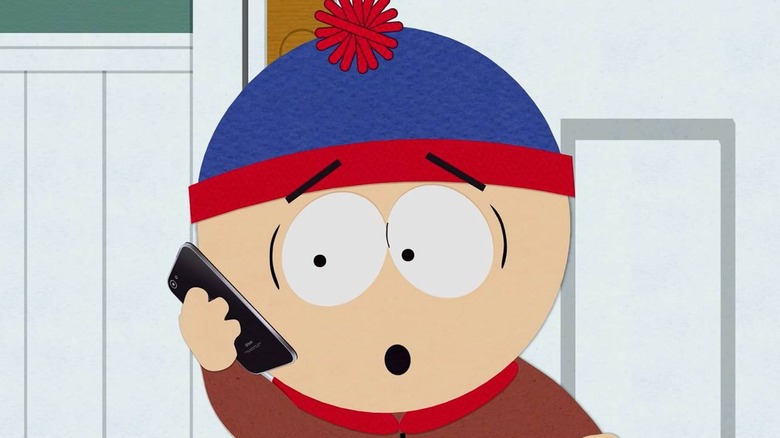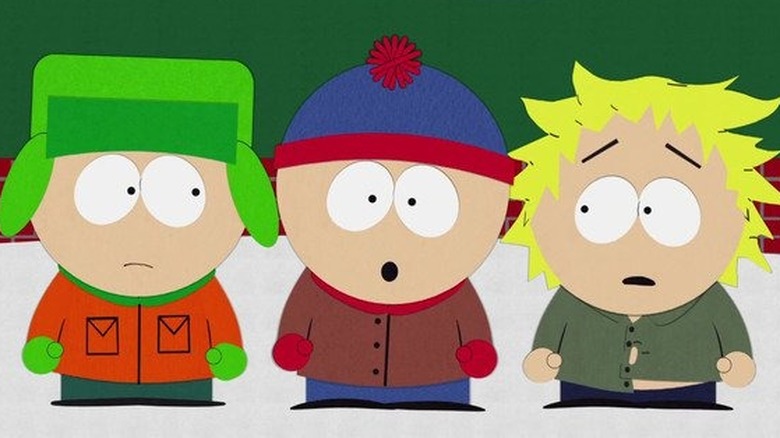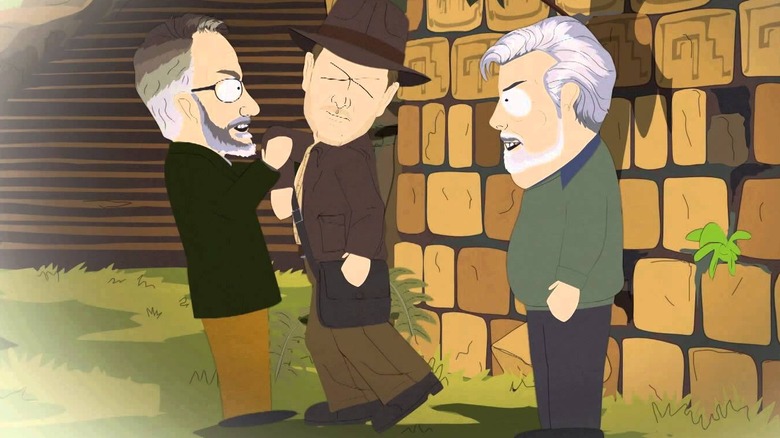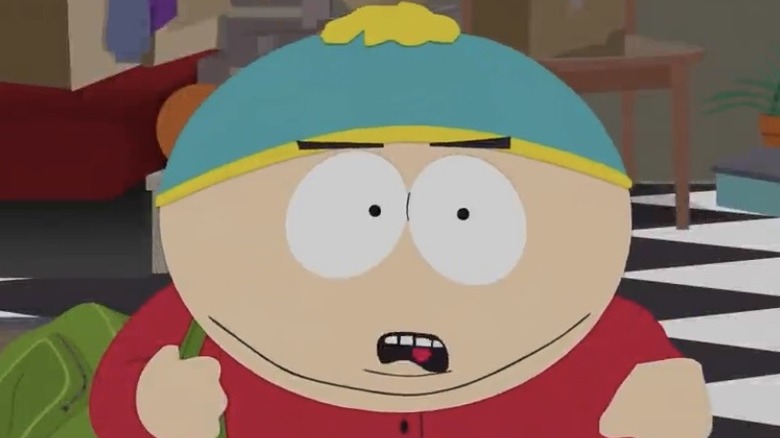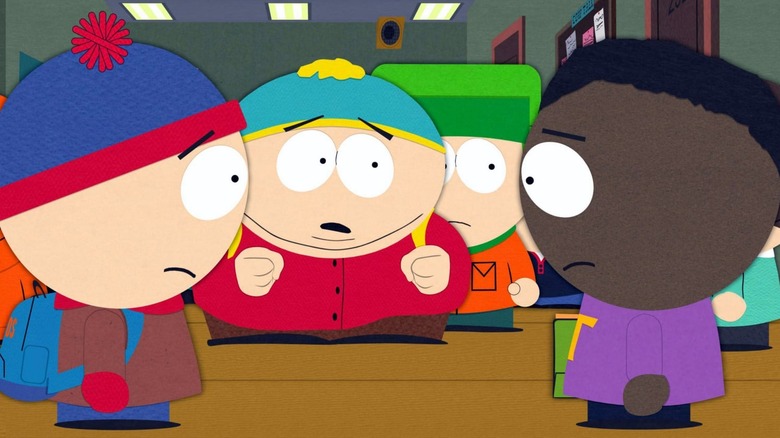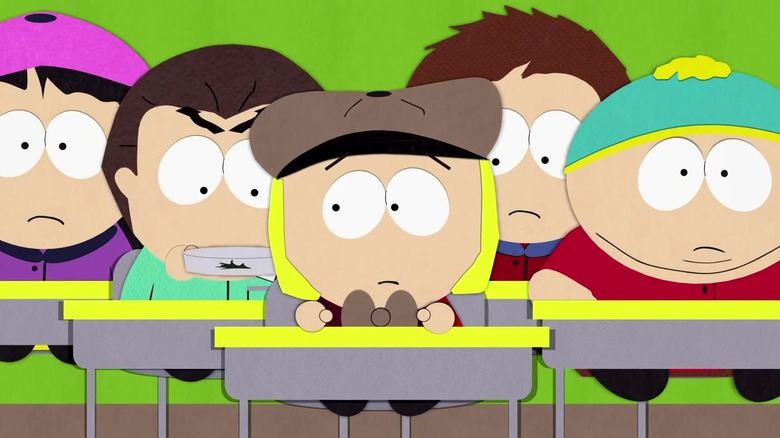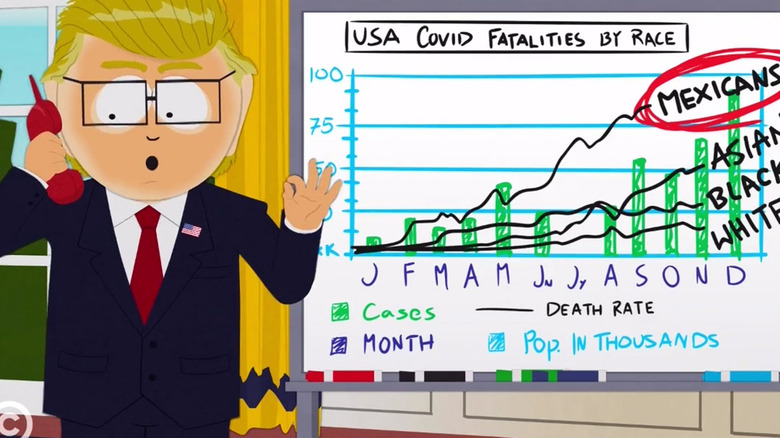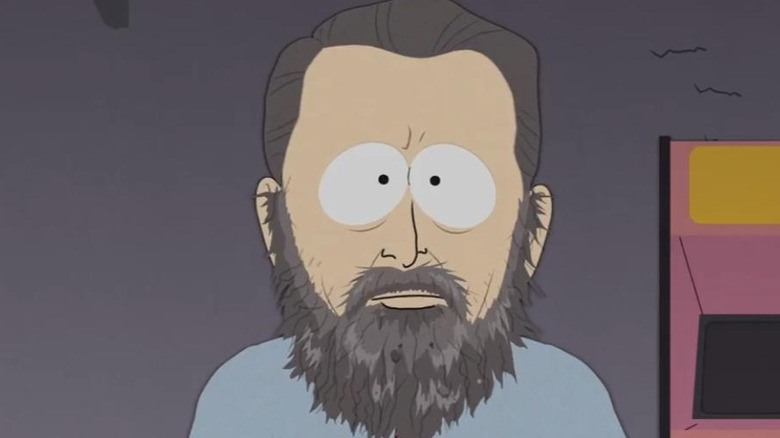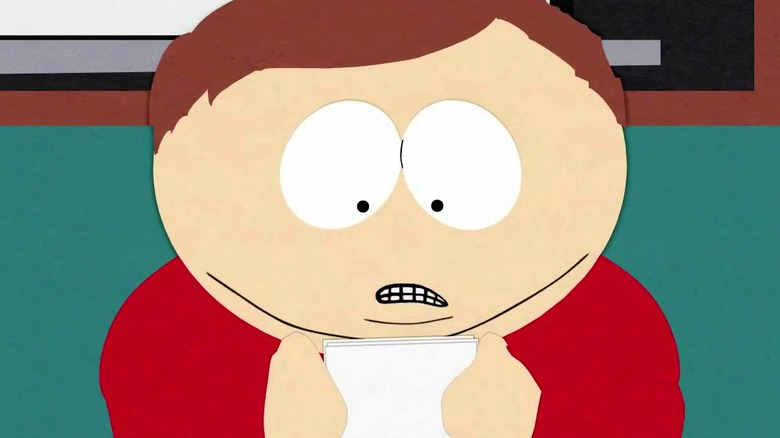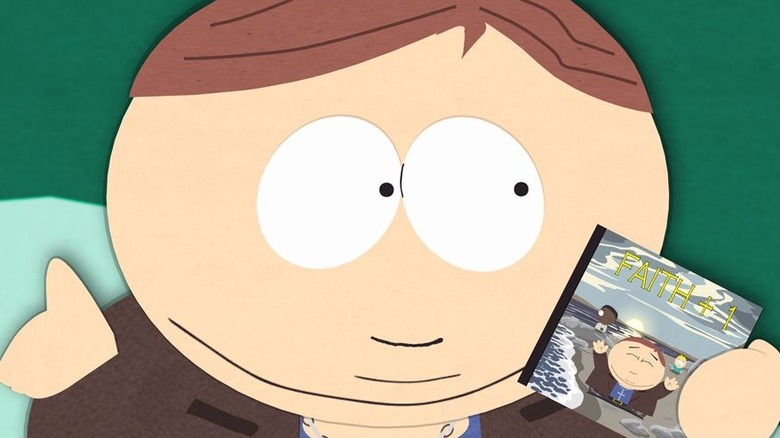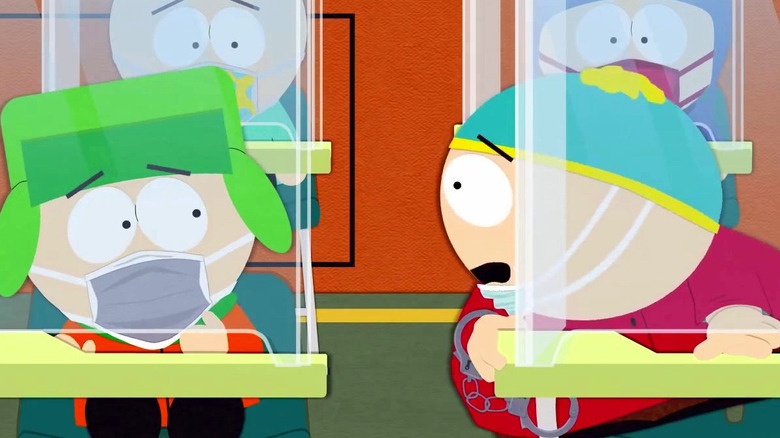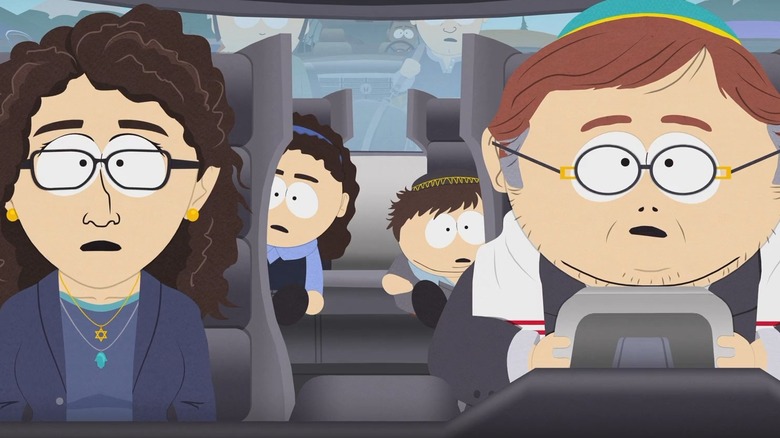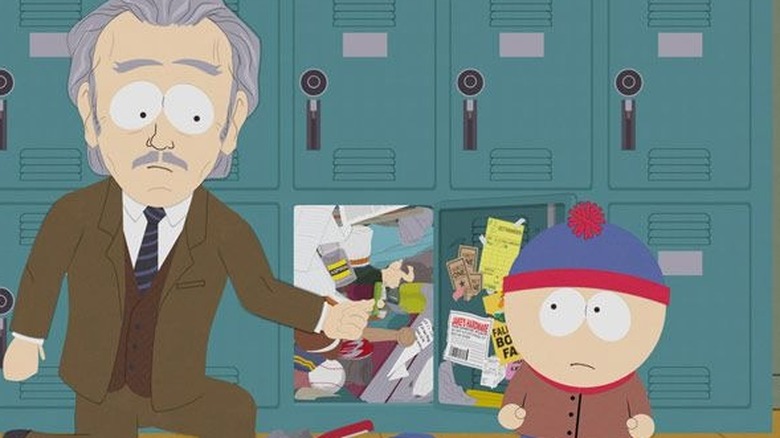The Best And Worst Things About South Park
"South Park" is without a doubt one of the most polarizing shows ever produced. Its basic description — a long-running animated comedy for adults that follows four elementary school boys and their escapades in a freezing Colorado town — might not imply as such. However, the series regularly goes to extraordinary, outlandish lengths — up to and including extremely dark humor — to ensure that its point is ingrained in the brains of its viewers.
"South Park" creators Trey Parker and Matt Stone signed up with Comedy Central in the mid-'90s because the snarky cable network was the only one they could find that was enthusiastic about a show with a talking piece of poo. By doing this, Parker and Stone set the tone for "South Park" early on, indicating explicitly that they need an environment that will grant them total creative control.
The nature of the show encourages viewers to recognize both the good and the bad in its approach. And whether you're thinking about watching the series for the first time or you're a seasoned fan interested in healthy "South Park" discourse, here are some ideas regarding the best and worst things about South Park.
Best: Metacommentary
Sometimes it feels like the political state of the world gets more complex gets more complicated every year, and so does the social commentary in "South Park." When a "South Park" episode is harshly critical of both sides of the political divide — which is often the case — viewers may lose focus and concentrate only on how the episode makes fun of their political opponents, failing to understand the intended point.
"South Park" counters this with a device known as metacommentary. The program will not hesitate to deliver its point to its viewers, even if that means breaking the fourth wall. For example, in the Season 25 episode "The Big Fix," Randy discovers that the residents of the town will no longer buy cannabis from firms that do not hire people of color. In order to convince the town that he's not racist so he can resume selling them weed, Randy enlists Stan to become friends with his black classmate Token. Soon enough, Stan discovers that Token's name has actually been Tolkien, in honor of famed author J.R.R. Tolkien, this entire time. So, Stan decides to read the works of J.R.R. Tolkien to make up for his mistake.
Several characters in the episode break the fourth wall to deliver the episode's message directly to the audience. Not only is the audience's assumption that the black character's name was Token called into question, but so is the notion that simply reading a handful of books might eradicate racism. The metacommentary ensures the audiences never lean into their biases and miss the main point.
Worst: An excess of irreverence
South Park fans and detractors alike agree on one point: this is a very irreverent show. Routinely poking fun at religion is one of the ways it demonstrates its commitment to taking absolutely nothing seriously. An ongoing theme in "South Park" is when an individual, regardless of their religious beliefs, considers themselves more enlightened than their peers, they become unbearable in the best-case scenario; in the worst case, they condone or inflict harm to protect the sanctity of their religion.
However, the show's religious satire can go too far at times. For example, "South Park" had a two-part storyline in Season 10, Episodes 3 and 4 — "Cartoon Wars." The storyline is Fox's "Family Guy" is set to run an episode featuring the founder of the Islamic religion Muhammad as a cartoon character. The entire town hides in a community center in fear of an Islamic terror assault in retribution. Producing an image of the Prophet Muhammad is considered something of a serious faux pas according to Islamic beliefs, but the "South Park" writers decided to push back against the censorious nature of this idea and insisted on Muhammad appearing on the broadcast. Comedy Central chose not to display Muhammad, and Stone and Parker received threats on their safety as a result of their stance. Regardless of how anyone feels about satire and religion and censorship, a person could argue that this kind of very direct tactic wasn't the best way for "Stone Park" to make this particular point?
Best: A subversive nature
Matt Stone once was quoted by The New York Times saying that he despises conservatives and liberals equally. These ideals are echoed by "South Park," which, unlike nearly every other TV show, does not limit its social commentary to condemning one side of any given issue.
The boys are accompanied by their classmate Tweek as they prepare an oral presentation for the town council in Season 2, Episode 17, "Gnomes." Tweek's father persuades them to discuss how a large corporation, Harbucks Coffee, threatens to put his small local coffee shop out of business. The boys succeed in convincing the townspeople, but eventually come to the realization that Tweek's father's coffee is not only inferior to Harbucks, but that Tweek's father is not really a decent person. So, the boys swap sides and persuade the locals to embrace Harbucks.
The episode was widely lauded for its subversiveness and for questioning the audience's bias of always assuming that small businesses are intrinsically more noble than global corporations. The show continuously challenges its audience's preconceptions, forcing them to think for themselves.
Worst: Too provocative for its own good
The ultimate goal of "South Park" is to entertain. While many episodes include a social or political commentary of some kind, others do not. Sometimes, the show deploys a level of provocativeness that doesn't match the levity of its subject matter. At these points, "South Park" feels like it's trying to be offensive for the sake of being offensive.
Several examples demonstrate that this provocativeness is not always justified. For instance, in the late 2000s, they aired two episodes that drew public ire. One features Steven Spielberg and George Lucas sexually assaulting Indiana Jones simply because the creators thought it was a funny gag to express how much they disliked the film "Indiana Jones and the Kingdom of the Crystal Skull." Some viewers thought "South Park went too far this time, even by late-'00s standards. The other episode shows Steve Irwin a mere handful of weeks after his real-life death with a stingray still lodged in his chest. To say the least, Irwin's widow was none too pleased.
These episodes fail not because they address difficult situations with the show's signature irreverence, but because the transgressive gags aren't supporting a purposeful message, or maybe they simply aren't funny enough to justify their shock value. "Britney's New Look" — a 2008 episode in which the public still wants to exploit Britney Spears after she's literally blown her own head off — has a prescient message about how society and culture was treating the real Britney and as a result, feels like it earns its provocativeness.
Best: Enlightening moments
"South Park" is frequently allegorical and manages to create a balance that is both enlightening and funny. This is when the newer episodes of the series are truly at their finest — when they manage to educate viewers on current sociopolitical issues as well as modern American history. The fact that "South Park" accomplishes this without coming across as pretentious or overbearing is a testament to the talent in the writers' room.
This is best exemplified by the specials "South Park: Post Covid" and "South Park: The Streaming Wars." The first extended episode follows the boys as they traverse contemporary concerns, such as how society dealt with the Covid-19 pandemic and our connection with consumerism and technology. The underlying theme is that working together is the only way to get through such a global catastrophe. The latter episode focuses on streaming companies and how they treat creatives, while addressing the West Coast's water scarcity issue.
The ingenuity of these episodes allows viewers to reflect on their own actions and views. The show ensures that every member of society may see themselves in at least one character and determine whether or not they are benefiting society.
Worst: The questionable necessity of bad taste
Even if you've never watched an episode of "South Park," you're undoubtedly aware that some people have found it offensive. Some assume that is the primary goal of the show, but usually it isn't — the writers are using shock tactics to make a greater point. However, considering the show's history of breaking taboos, the idea that offensiveness might be the primary goal of "South Park" isn't entirely baseless.
In late 2006, Michael Richards of "Seinfeld" fame sparked outrage when he raged at a heckler in a comedy club, repeatedly calling him the n-word. "South Park" responded to the incident with an episode aptly titled "With Apologies to Jesse Jackson." The episode itself is remarkable in its depiction of racism and how it is dealt with in America. Even a civil rights organization associated with the NAACP praised it. The main drawback of the episode is, possibly by necessity, it has multiple white characters using the n-word.
Maybe this isn't a problem with "South Park" so much as a conundrum with social satire. If there's a despicable slur or object or person or idea that an artist wants to mock in order to denounce it, then does the artist have to recreate the despicable thing in their work? "With Apologies to Jesse Jackson" might be one of the best "South Park" episodes, but do we definitely need to hear a white guy yell the n-word in a story about why white people using the n-word is reprehensible?
Best: Great writing
One of the most enjoyable aspects of watching "South Park" is the writing, and the creators have the awards to prove it. However, what truly jumps out about the writing approach on "South Park" is their "But and Therefore" rule. In a clip from a New York Times-affliated project called "Stand In," Parker demonstrates this by explaining each story beat on "South Park" is connected by a "but" or a "therefore," rather than an "and then." In this way, the creators ensure that every action the characters take has consequences.
As shown in the documentary "6 Days to Air: The Making of South Park," Stone and Parker write in an astonishingly short amount of time. This allows the authors to not only express whatever social commentary they care to at the time, but also assures that they don't have time to second-guess themselves, which means their audience gets something that was on the top of their minds at the time.
The quality of "South Park" never plummets because the writing process assures that they always generate something timely. Few long-running shows can claim such consistency.
Worst: Too much social commentary can be a bad thing
The tendency of "South Park" to rely on social commentary creates classic episodes, but sometimes it creates problems. While the creators are clearly experienced in this storytelling style — they even earned a Peabody Award for social commentary — they sometimes lean into it too far. This limitation and their desire to write quickly may occasionally dilute their show. For example, when they decide to conduct a serialized season, the outside world's events might shift too soon, leaving them unable to keep up with reality and merely regurgitating what has already transpired.
Because of the factors mentioned above, the later seasons are frequently regarded as the worst "South Park" seasons. The writers of Season 20, in particular, predicted that the 2016 U.S. presidential election would go a certain way, but then it went in the opposite direction. As they struggled to keep up with the news, the narrative devices they had devised around their prediction were simply abandoned.
The program has, however, perhaps found its footing again thanks to specials and shorter seasons. Fans should be relieved that the show is back on track since, according to Bloomberg, a contract has been reached for producing 14 other movies and six additional seasons of "South Park."
Best: A capacity for self-awareness
If there's one thing "South Park" never does, it's sitting on the fence on a topic that piques the writers' interest. The drawback is that as a result of an imperative to speak out and the quick turnaround time for their episodes, they frequently make mistakes. And after 25 years of production, the best approach to these mistakes is to simply own up to them every once in a while.
Multiple times, "South Park" has returned to a previously covered topic and admitted that they were mistaken in their initial assessment. This is most clearly demonstrated when Al Gore (the fictional "South Park" version of Al Gore, anyway) and ManBearPig return in the episode "Time to Get Cereal" from 2018. In his first appearance in the 2006 episode "ManBearPig," "South Park" mocks Al Gore for his claim that a part-man, part-bear, part-pig monster is going to cause global catastrophe. But in "Time to Get Cereal," the characters on the show admit that they were incorrect to mock him, and ManBearPig is a serious threat after all. (ManBearPig is a metaphor for climate change, if that's not obvious.)
It's critical for a show of this level to consistently call themselves out when they make errors. We don't want to think there are a ton of people out there who base their politics and their worldviews on "South Park," but to whatever extent those people exist, Parker and Stone can't let them get too many of the wrong ideas.
Worst: A capacity for bad choices
"South Park" occasionally rushes to judgement with its depiction of social topics, however, the writers have also failed to accurately predict how their audience will react to certain themes and running gags.
A good illustration of this is Season 9, Episode 11, "Ginger Kids" when Cartman tries to show that being a ginger is an illness and starts getting the whole community to shun folks with red hair and freckles. In response, the boys decide to teach him a lesson by dying his hair red and applying henna freckles on him. Cartman faces discrimination at first, but eventually resolves to lead the gingers in a Nazi-style takeover of the entire world. Kyle manages to stop him by informing Cartman that he is not a genuine ginger.
Maybe we can forgive Parker and Stone for assuming their viewers all understood Cartman is a jerk, should never be emulated, and we should assume literally everything he says is a lie. But the episode also includes a handful of moments that sort of justify discriminating against gingers, and partially as a result, Kick a Ginger Kid Day became an actual event celebrated by some bafflingly cruel schoolchildren.
Best: Hilarity
We bet that for even the biggest "South Park" skeptics will find themselves laughing out loud at some of the best episodes. Meanwhile, fans applaud the show for not holding back while mocking politicians, celebrities, or various other things we all hold dear. When the first season premiered, the New York Times described the series as "hilariously candid about faith, family and death as well."
From movies to social media outrage, "South Park" has made fun of practically everything in contemporary culture. It has produced episodes that can make you smile just by reading the logline. For example, after discovering that he can compose gospel songs by altering a few lyrics from secular songs, Cartman forms a Christian rock band that "writes" gospel songs with sexual innuendos. In other episode, Cartman buys an amusement park and vows not to let anyone else in. Some of the best episodes of "South Park" include similarly absurdly amusing scenarios.
The show's legacy is ultimately determined by how hilarious these episodes are because, for both old and new fans, their first relationship with the show depends on how hard it makes them laugh.
Worst: Cynicism
A lot of the commentary in "South Park" is bleak. The creators tend to portray humans in the worst possible light. As a result, the majority of the residents of South Park are some of the worst characters on television, with few redeeming qualities.
For example, in the program's pandemic special, the show did something novel by transporting the boys to the future and depicting them as fully grown men. While this future isn't as dystopic as we might expect from "South Park," every facet of human existence has been branded as part of a corporate franchise. Everyone appears lonelier and a little worse except for Cartman, who has transformed himself from an antisemite to a rabbi.
The issue with projecting this degree of nihilism onto an impressionable audience is that they may get the idea that everything is already broken and that any attempt to repair society is a waste of time. Even if unintentionally, "South Park" has pretty much sent a message over the years that anyone who has an opinion on any political or social topic is somehow corrupted. While we can't entirely fault "South Park" for this, maybe they could've done a better job of providing viewers with more uplifting conclusions. Happily, the sequel to the pandemic special contains exactly the sort of pragmatic optimism we're talking about.
Best: A one-of-a-kind animation style
To put it mildly, the animation on "South Park" is not initially easy on the eyes. The animation technique is based on the series pilot, which employed carboard cutout animation. "South Park" is now done digitally to meet the writers' speed while developing new episodes, allowing them to generate an episode as quickly as possible. Although the animation style is not what anyone would call "pretty," viewers will find it helpful in discouraging any inclinations they have to take the show too seriously.
The animation style works so well for this series because it, along with the absurd voices and awful impersonations, serves to remind the viewer that this is simply satire. Stan, Kyle, Cartman, and Kenny aren't real. If Kenny is killed, you aren't traumatized by the sight of horrific child death, because you understand on every level that Kenny is a cartoon, and he will be just fine.
Worst: That time South Park accidentally ripped off CollegeHumor
Many creatives will tell you plagiarism is the most significant error you can make in their profession. For example, the creators of "South Park" attempted to spoof Christopher Nolan's sci-fi film "Inception" in an episode dubbed "Insheeption." Problems arose when some fans noticed parallels between that episode and a parody of the same film on the YouTube channel CollegeHumor. Parker and Stone eventually confirmed their error to the New York Times and personally apologized to the clip's makers.
The show's creators claimed that they tried to get a film screening but could not obtain one or the film on DVD. So, they chose to watch YouTube parodies of the movie instead, and the lines they used on "South Park" they assumed were from the original movie were actually from one of the parodies. This is a plausible argument, and it's also worth mentioning that the makers of the CollegeHumor clip, Dan Gurewitch and David Young, accepted their apology.
Their explanation is even more plausible given what Bill Hader said about his experience working in the "South Park" writing room. Hader shared that when he came up with an idea, the first thing Parker did was Google it to see whether it had previously been used.
